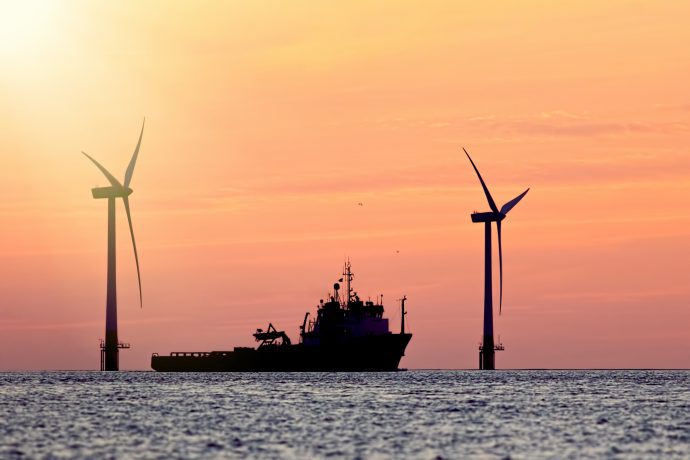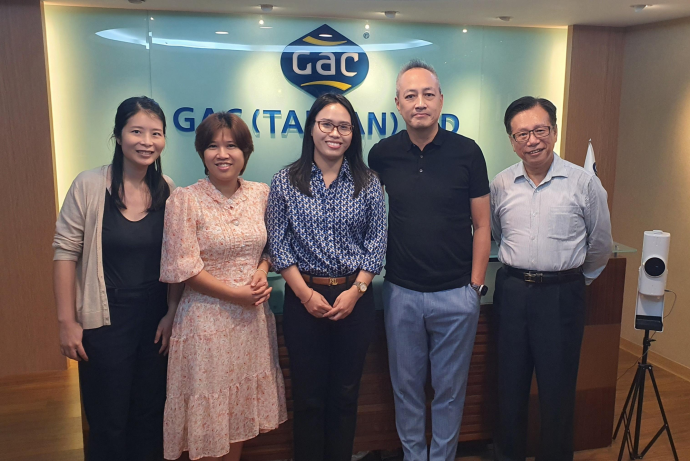As the Asia Pacific region accelerates its pace of energy transition, vast opportunities for business expansion are emerging – and GAC is well geared to support growing customer demands.
From a small trading office in Hong Kong in 1975, Asia Pacific is now one of the Group’s most important regions. With continued regional expansion and drawing upon its global expertise, GAC is building a synergy that bolsters the region's renewables ambitions.
Energy focus
Having participated in building the oil & gas infrastructure in the Middle East and the Caspian Sea from the seabed up, the energy sector has been one of GAC’s long-term priorities since its early days. Today, drawing on the Group’s global experience and expertise in core supply chain, offshore and agency services, GAC delivers end-to-end services to optimise the shipping, logistics and offshore operations of its rapidly expanding upstream, downstream and now burgeoning renewable energy customers.

In Europe and the Middle East, GAC has already established itself as a provider of key services for offshore energy projects under construction, coming online and already producing energy. Whether it’s the transportation of a drill pipe to a land-based yard, getting wind turbines to onshore or offshore destinations, rig mobilisation, agency services for supplies and personnel, or delivering specialised heavy equipment and spare parts through an integrated supply chain, GAC delivers from vendor to vessel deck, rig floor or any other destination, no matter how remote.
"Expertise is crucial in supporting the various energy projects happening around the world – be it oil & gas or renewables, and GAC is in a good position to provide just that,” shares Erland Ebbersten, GAC’s Group Vice President, Marine & Energy. “With over 60 years of experience in the sector, we have built up a pool of technical expertise, global network and experience to cover the entire energy spectrum.”
Increased pace in Asia Pacific
Global efforts to shift from fossil-based systems of energy production and consumption to renewable energy sources have been on the up.

China holds nearly one fifth of the world’s prospective wind capacity and is on track to double its wind and solar capacity by 2025 when all prospective projects are successfully built and commissioned - five years ahead of its 2030 target of 1,200 GW.
To its east, Taiwan has positioned itself as a leading market for renewable energy. To boost its renewable energy sources to 20% of electricity production by 2026, the nation has earmarked some US$32 billion for renewables, hydrogen and carbon capture and storage investments.
The latest initiative to develop alternative energy in Thailand is the Alternative Energy Development Plan, which aims to increase the share of renewable energy to 25% of total production. The Energy Absolute Public Company Limited is constructing three wind farm projects in Nakhon Si Thammarat Province with combined installed capacity of 126 MW, and has five more projects planned for Chaiyaphum Province which will produce 260 MW of electricity.
Its neighbour, Vietnam, has similar ambitions, with the central government indicating strong support for wind development by extending feed-in tariffs for wind-power projects from 2021 to the end of 2023. The next wave of investment in renewables will likely include substantially larger projects, witnessed by the fact that the world’s largest offshore wind farm company recently opened a Vietnamese office and signed a memorandum of understanding to develop several gigawatts of offshore wind projects in Bình Thuận and Ninh Thuận.
Meanwhile, the busy maritime hub of Singapore takes advantage of its location at the crossroads of major shipping lanes to act as a support centre for regional offshore projects and activities, with energy companies using its shipyards for vessel modifications and repairs.
Long-term strategy
To complement its long-term growth strategy, GAC is leveraging its expertise in other parts of the world to support the Asia Pacific’s energy transition. This includes opening new offices working in seamless synergy with its existing network to provide integrated solutions to meet the sector’s evolving needs.
In November last year, the Group opened its third office in Taiwan, at its second-largest port, Taichung, following the port’s recent developments in the offshore energy sector including the construction of tailor-made wharves to serve the offshore wind energy industry. GAC’s office at the port puts it closer to project sites, enabling it to respond more quickly to the growing needs of our customers. The new office complements GAC Taiwan’s two other offices, in Kaohsiung and Taipei.

GAC’s new office in Vietnam’s Ho Chi Minh, opened in March this year in response to growing demand for shipping and logistics support, is testament to the country’s strong economic activity as well as its potential for growth and development in maritime and offshore services. The Group has been active in Vietnam for many years through local partners and agents, but the new office is indicative of a serious optimism for operations there in the near future.
And just this month, GAC opened a new office in Sabah, Malaysia, which is poised for major growth, most notably in its energy sector.
“By drawing from the lessons learned in previous decades, GAC's offices in both existing and new locations are in perfect position to work together to meet customers’ needs across the region,” says Daniel Nordberg, GAC Group Vice President of Asia Pacific & Indian Subcontinent.
“By complementing each other's strengths, we can play a part in driving the growth of offshore and renewable energy ventures in Asia. This synergy, coupled with our existing relationships with global energy customers, promises seamless project execution and gives us a competitive edge when bidding for new businesses.”

New staff with energy expertise have been hired to fill knowledge gaps, while employees with offshore experience, including managers from Europe and Middle East, have been relocated to support the emerging energy business in Asia.
GAC’s in-house training arm GAC Corporate Academy also organises professional courses such as GAC Energy Services (GES) and Advanced GES to equip staff with in-depth knowledge about the energy sector and important aspects of growing a strong, global and integrated energy business.
GAC is positioning itself as a key player in supporting the energy sector, driven by a vision for sustainable development and collaboration.
“Our long-term growth strategy will take time,” shared Erland. “Through expanding our network, developing our workforce, and strengthening our integrated service offerings, GAC aims to play a pivotal role in shaping the dynamic and thriving energy landscapes of Asia and beyond.”